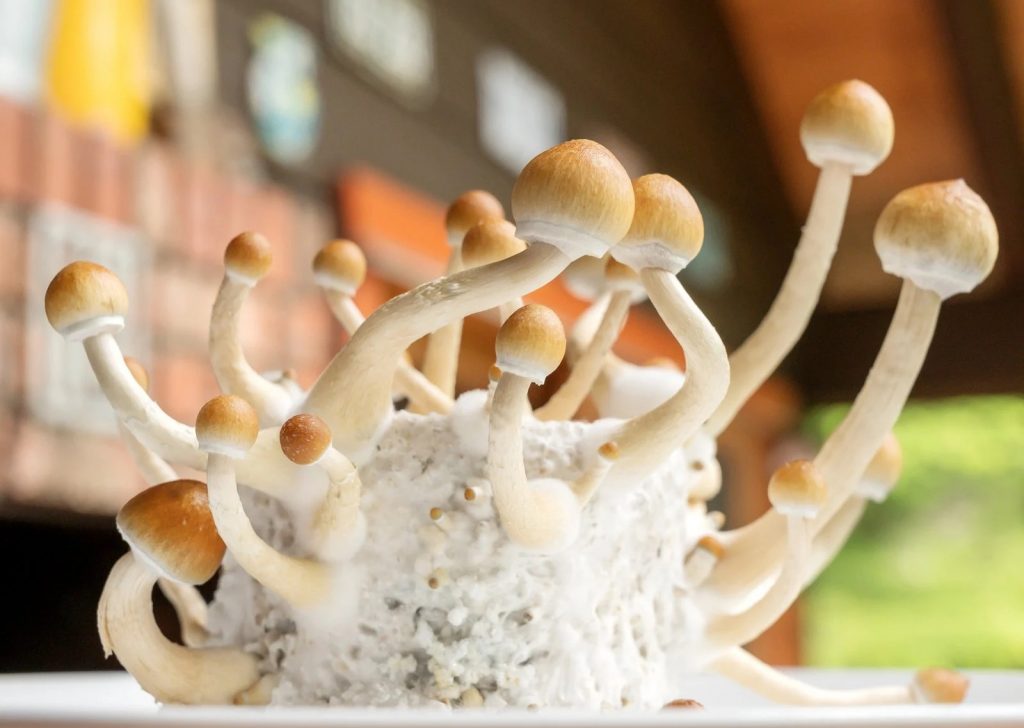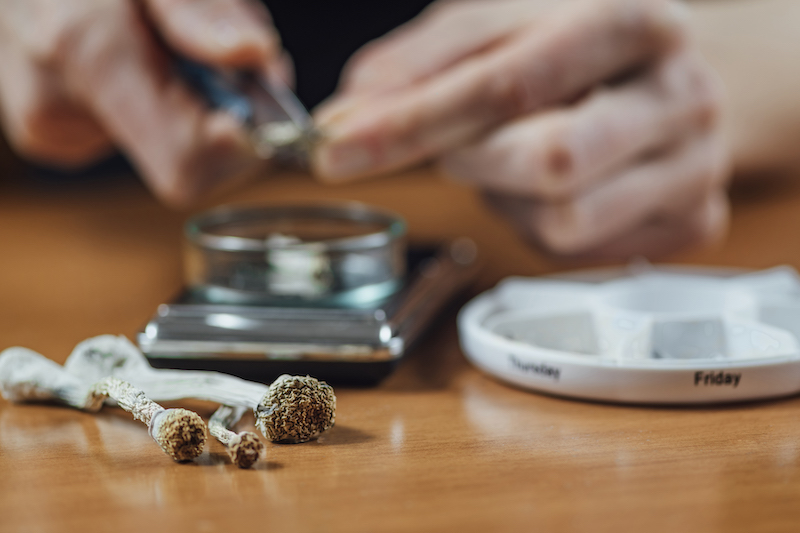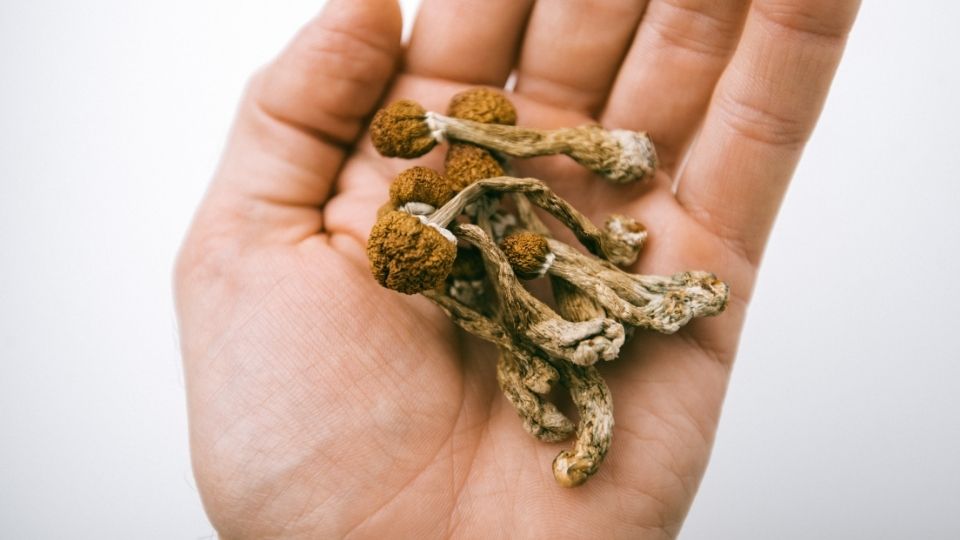Growing mushrooms can be a fun hobby, especially for those interested in microscopy. And for that reason, the mushroom business is booming across the United States. If you’ve ever considered mushroom cultivation for fun or for food, now is a good time to get started.
Commercial and home-based mushroom farms are rising in popularity across North America. Wildy accessible mushroom grow kits can be found in a variety of stores, or even ordered off Amazon. There are around 14,000 known species of mushrooms. Hundreds of species are edible such as shiitake, oyster mushrooms, and lion’s mane. Over 70 species are poisonous – it’s best to avoid those ones. Finally, over 200 species of mushrooms belong to the genus of Psilocybe – these are the ones commonly called “magic mushrooms.”
If you’re curious about how to grow mushrooms, or how to start your own mushroom farm, keep reading while we explore the fascinating world of mushroom cultivation.

The History of Mushroom Cultivation
Mushrooms are known as a source of food and medicine, so it’s no surprise that mushroom cultivation dates back over a thousand years. Many popular species of mushrooms were first cultivated in China between 600-1800 AD. Prior to the 1900s, only one major commercially cultivated species of mushrooms was not originally grown in China (Agaricus bisporus, cultivated in 1650 AD in France).
While magic mushrooms are often associated with the culture of the 1960s and 70s, historical evidence indicates psilocybin may have been used in ancient ceremonies of the Aztecs, and some researchers believe North African and European cave paintings from as far back as 9,000 BC indicate the use of magic mushrooms. We might not be 100% sure of the ancient uses of magic mushrooms, but we do know for a fact they were introduced to modern North America in 1957. We know R. Gordon Wasson learned about magic mushrooms while traveling through Mexico, brought some back to the States, and wrote an entire piece in Life magazine about it. In 1960 the Harvard Psilocybin Project launched, with the goal to conduct experiments based on psychedelic drugs. However, by 1970 psilocybin mushrooms were made illegal across the united states. In 2018 research at Johns Hopkins University confirmed magic mushrooms have medicinal uses in the treatment of things like PTSD, depression, and anxiety.
Now, in 2023, the possession of psilocybin, as well as growing and selling magic mushrooms is decriminalized in a handful of states or cities including Colorado, Washington DC, and select cities in California, Michigan, Massachusetts, and Washington. Many other states have proposed legislation to decriminalize shrooms, and lawmakers have expressed interest in possibly decriminalizing psilocybin. Research continues to illustrate the possible medicinal benefits of psilocybin, and advocates and mushroom enthusiasts continue to push for legalization and decriminalization. Outside of the United States, a handful of countries have legalized the possession and use of psilocybin, and many others have decriminalized it, or lack enforcement, especially with its use by indigenous people.
In the meantime, in most other states (with only a few exceptions: California, Idaho, and Georgia) psilocybin spores are legal with the intent to study them with microscopy.
More recently, mushrooms have found their place in the plant-based meat market, and even in the creation of vegan leather, and sustainable plastic substitutes.
Mushrooms truly are fascinating organisms, with many benefits. Learning how to grow mushrooms is not as difficult as it may seem.

Why Should I Start Growing Mushrooms?
Aside from the many possible benefits of mushrooms, mushroom cultivation can simply be a fun hobby. Edible mushrooms can feed you and your family – they’re delicious and healthy. Magic mushrooms and other medicinal mushrooms may improve not only your mental health but physical health. Benefits may include reduction of anxiety and depression, mood stabilization, help with addiction recovery, and possibly benefit folks suffering from post-traumatic stress disorder, just to name a few.
Mushrooms are simply fun! They’re cool to look at, cool to study, sustainable, and beneficial. Plus setting up your own in-home mushroom farm is fairly cheap and easy. Although you’ll probably make some mistakes the first time around, fixing the common ones is simple enough.
Mushroom farming is still a newer type of agriculture in North America, and there is plenty of opportunity to grow and share your own mushrooms. Annual mushroom sales in the united states are around one billion dollars – the majority of those sales coming from Pennsylvania and California. It’s a growing industry.
Whether you want to start growing mushrooms for your own enjoyment and experience, to feed yourself and your family, to make a profit, or to research magic mushrooms, Top Mushroom Spores can help you start your journey.

How to Grow Mushrooms
Once you’ve decided you want to start your own mini mushroom farm, the first step is deciding which spores to use. Spores are the mushroom equivalent of a plant seed. While we believe spores to be the easiest way to start growing mushrooms, and Top Mushroom Spores has plenty of varieties to choose from. You can also start with mushroom spawn. While growing them from psilocybin spores is only decriminalized in certain areas, growing other varieties of mushrooms that contain no psilocybin is allowed all across the country.
The ideal way to grow mushrooms at home is to mimic the natural environment. The growing process of mushrooms is broken down into four main parts: inoculation, incubation, fruiting, and harvesting. You’ll need spores, a substrate, a container, and a dark environment. The length of the process depends on the species of mushroom. The majority of magic mushrooms will be ready for harvest in four to six weeks after inoculation.
Growing mushrooms is a fun hobby. If cultivating magic mushrooms is not legal in your state, you can still start your mushroom journey by studying some spores through microscopy and taxonomy. You can even prepare for if and when magic mushrooms will be decriminalized by cultivating other varieties. Either way, we’re just excited to introduce you to the fascinating world of mushroom cultivation.